 Are you thinking, what in the world is a locavore?
Are you thinking, what in the world is a locavore?
And, is this a good thing or a bad thing?
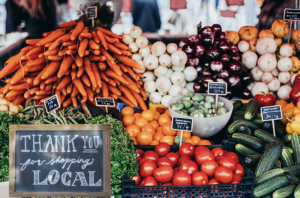 “Locavore” is used to describe someone who tries to eat locally grown or produced foods as much as possible. “Local” can mean different things to different people. For some, it may mean foods that are grown within 100 miles of their homes. For others, “local” may mean food grown in a certain region (like the Midwest or the Pacific Northwest).
“Locavore” is used to describe someone who tries to eat locally grown or produced foods as much as possible. “Local” can mean different things to different people. For some, it may mean foods that are grown within 100 miles of their homes. For others, “local” may mean food grown in a certain region (like the Midwest or the Pacific Northwest).
We will admit, we could be considered locavores, at least to some degree. We grow fresh herbs in our backyard, we buy as much food as possible from our local farmers and we favor restaurants that use fresh, in-season ingredients from local farmers and producers. Being in Kansas, there are some foods we simply can’t buy from local producers – things like olive oil, bananas, pineapple, salmon and tuna.
Does that mean we are “part-time locavores?” There must be a name for this, right?!
Consider this…at one time, everyone was a locavore!
If you think about it, and if you go back far enough in history, everyone was a locavore. There was no means to preserve and ship food all over the country (let alone all over the world). People ate what they could grow and catch locally…there was no other choice!
Obviously, things have changed dramatically. Today, there are methods to harvest and preserve foods that allows them to be transported not just across state lines, but also from one country to another and one continent to another. This explains why you can buy a watermelon from the store in April and asparagus in September.
Why is it a good thing to be a locavore?
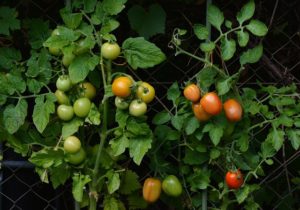 Nutrition and taste! The best examples are herbs or vegetables straight from your garden. And, it doesn’t have to be a fancy garden…it can simply be pots on a patio.
Nutrition and taste! The best examples are herbs or vegetables straight from your garden. And, it doesn’t have to be a fancy garden…it can simply be pots on a patio.
You step outside your door, harvest them and, within minutes, you are enjoying them as part of your meal. Especially if you are using good soil and good growing practices, these will be the most nutrient-dense and flavorful ingredients you can get.
Crazy fresh! When you buy from local farms or visit the farmers’ market, chances are the produce you are buying was harvested within the past couple of days. This past Saturday, we bought some Swiss chard at our local farmers’ market, and the couple who grew it told us, “we picked the Swiss chard this morning while we were warming up the truck!” Talk about fresh! We also bought several pounds of asparagus, which was harvested on Friday, the day before we bought it. We are often asked about the “woody” tough ends of asparagus. When it is picked fresh like this, those tough ends don’t exist!
Compare this to produce which is grown hundreds or thousands of miles away.
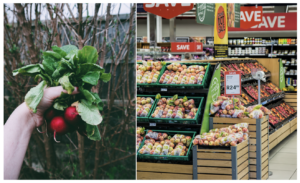 This produce is often harvested before its peak and is likely treated with chemicals or other preservatives so it can survive the long journey on trucks, in warehouses, to the store, to the shelves and ultimately into your kitchen. The nutrient density and flavor just won’t be the same vs. the produce that came directly from your garden or from a local farm.
This produce is often harvested before its peak and is likely treated with chemicals or other preservatives so it can survive the long journey on trucks, in warehouses, to the store, to the shelves and ultimately into your kitchen. The nutrient density and flavor just won’t be the same vs. the produce that came directly from your garden or from a local farm.
Picture a bunch of asparagus that was grown in California (or possibly in China). With that long journey, there is no way the nutrition and taste will compare to the bunch just picked by a local farmer the day before you buy it!
Plus, there are more reasons to eat like a locavore:
- Allows you to eat with the seasons. Buying as much as possible locally will result in eating whatever is in-season. Not only will this help you enjoy a wide variety of foods throughout the year, it is fantastic for your health and will help save you some money too!
- Environmentally-friendly. Every local purchase reduces the amount of food that has to be transported across the country. While these individual purchases may not seem like they make a difference, they can make a big difference when you look at them in total.
 Support your local economy. There are many good reasons to support local farmers and producers and your local economy. Buying from people who truly care about your community and your local environment – and people you can develop a personal relationship with – is much more fulfilling!
Support your local economy. There are many good reasons to support local farmers and producers and your local economy. Buying from people who truly care about your community and your local environment – and people you can develop a personal relationship with – is much more fulfilling!
- Good growing practices. Buying local allows you to get to know your farmers and producers and ask them questions about their growing practices. Just like anywhere, there will be variations in how local producers plant, grow and harvest their foods. The opportunity to talk directly to these producers allows you to identify those who use practices consistent with your preferences. And, don’t exclude anyone just because they are not certified “organic.” Many farmers and producers use organic practices, even if they don’t take on the cost to get the official certification.
How to become a locavore?
To increase the amount of locally grown and produced foods you are buying, there are many great options:
 Grow a garden. It could simply be a couple of kale plants (in Michigan, Zonya has grown kale well into December!), fresh herbs (we have had great luck with basil, oregano, rosemary and mint) or a small, medium, or large vegetable garden. Whatever the scale, growing a garden can be very rewarding.
Grow a garden. It could simply be a couple of kale plants (in Michigan, Zonya has grown kale well into December!), fresh herbs (we have had great luck with basil, oregano, rosemary and mint) or a small, medium, or large vegetable garden. Whatever the scale, growing a garden can be very rewarding.
- Visit your local farmers’ market. There are over 8,600 farmers’ markets in the U.S. and the options have never been more plentiful. For anyone participating in the Supplemental Nutrition Assistance Program (SNAP), many farmers’ markets now have “Double Up” programs, which allow participants double their spending money when buying fresh produce. To search for farmers’ markets in your area, go to this National Farmers Market Directory.
 Join a CSA (Community Supported Agriculture) program. Basically, this is a way to invest in and take advantage of the fresh produce grown by a local farm. It is like having a small ownership in the produce that comes from the farm and results in a strong relationship between you and the farmer(s). It is a great way to celebrate the seasons and help support local farmers while enjoying a bountiful amount of ultra-fresh produce. Although not a comprehensive list, LocalHarvest can help you identify local CSAs.
Join a CSA (Community Supported Agriculture) program. Basically, this is a way to invest in and take advantage of the fresh produce grown by a local farm. It is like having a small ownership in the produce that comes from the farm and results in a strong relationship between you and the farmer(s). It is a great way to celebrate the seasons and help support local farmers while enjoying a bountiful amount of ultra-fresh produce. Although not a comprehensive list, LocalHarvest can help you identify local CSAs.
- Support restaurants that buy local, in-season ingredients. Every community has them!
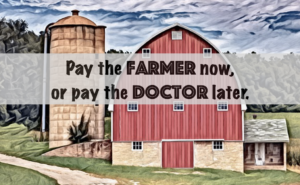 If you aren’t already shopping local, now is a great time to start!
If you aren’t already shopping local, now is a great time to start!
Go ahead and pick three foods to start buying locally.
There are many options to choose from: produce, meats, eggs, cheese, milk, honey, jams & jellies, salsas, BBQ sauce, breads and more!
We think you will be glad you did —
please share your stories with us!
 LEARN MORE ABOUT THE NAPKIN!
LEARN MORE ABOUT THE NAPKIN!
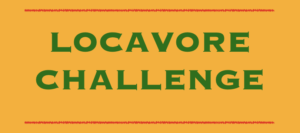
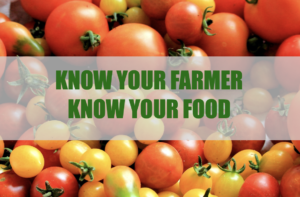
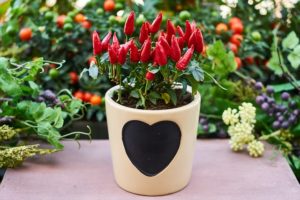
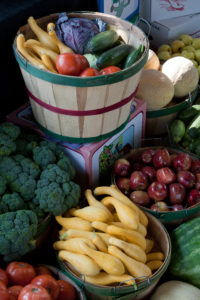
Leave A Comment